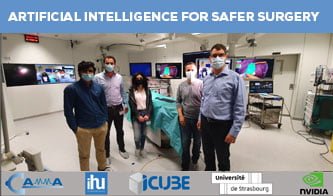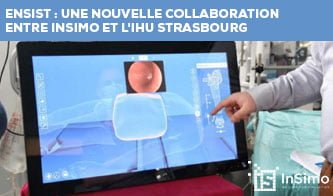
Artificial Intelligence for Safer Surgery
Clinicians and computer scientists at CAMMA, a joint research group between IHU Strasbourg and ICube/University of Strasbourg, have teamed up to improve safety in laparoscopic cholecystectomy using artificial intelligence (AI).
The Strasbourg-based team first proposed the 5-second rule, a simple yet effective cognitive aid to promote the implementation of guidelines for safe cholecystectomy. In an article published in the Journal of the American College of Surgeons, they demonstrate that a 5-second-long intraoperative time out to recall best practices induces a three-fold increase in the achievement of the Critical View of Safety, an essential step to prevent bile duct injuries.

In a commentary entitled “Time to Stop and Pause”, the lead author of the worldwide guidelines on safe cholecystectomy Dr L Michael Brunt writes:
“Of all the quality improvement measures implemented in surgery and medicine over the last many years, the simple act of a momentary pause to stop, look, and reflect before proceeding with an irreversible step in an operation, may arguably have one of the highest benefit-to-risk ratios, especially given the minimal time to do it and the considerable potential upside for enhancing patient safety”
Concurrently, the same team has developed and published on the Annals of Surgery DeepCVS, the first AI model capable of recognizing important anatomical structures and automatically assessing the achievement of the aforementioned safety view to provide surgeons with intraoperative decision support.
To try DeepCVS, please visit: https://deepcvs.ihu-strasbourg.eu
Finally, in a second article in the Annals of Surgery, the team presents EndoDigest, a computer vision platform providing short videos selectively documenting critical steps of procedures to promote transparency, research, and education in surgery.
The multidisciplinary team led by Prof. Nicolas Padoy is now starting collaborations with other surgical centers and industrial partners like NVIDIA to validate and optimize these prototypes, essential steps to translate these and other AI algorithms to operating rooms and finally generate value for patients, surgeons, and healthcare systems.

To learn more or contact the team, please visit:
http://camma.u-strasbg.fr




Recent Comments